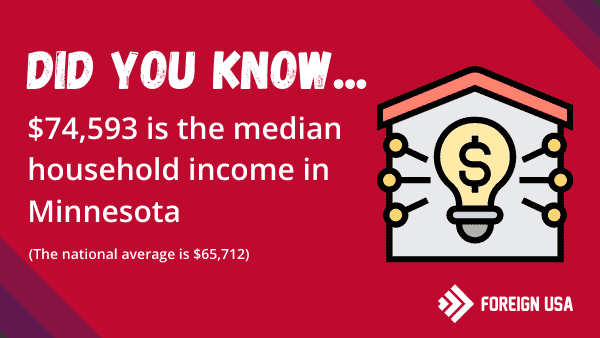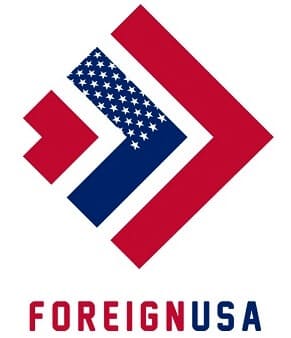Minnesota is not necessarily known to be at the epicenter of America’s economy, however, the state is a place where companies both large and small thrive due to its steadfast economy and economic strength, which is one of the most diverse in the U.S.
The state of Minnesota and the Secretary of State provides a wide range of incentives, grant programs, access to loans, and State Tax Incentives to small and medium-sized businesses.
If you register a new company in Minnesota, you can benefit from several programs that are offered that include SCORE Minnesota, Small Business Administration, and Small Business Association, to name a few. Links to these resources are at the bottom of the page.
Some gifted entrepreneurs with incredibly bright minds are lured into starting a business in Minnesota for many different reasons. The Land of 10,000 Lakes is not only in the perfect location from being surrounded by many other U.S. states that have large consumer markets, but it also borders another country. This makes importation and exportation very fluid and efficient, but it also boasts many other pro-business qualities, which is why there are so many small businesses thriving within the state (over 526,000).

The state also has a greater share of small businesses than most other states. Many states rely heavily on much larger businesses with 500 or more employees to make up the majority of their employees, which demonstrates why Minnesota is a very pro-small business state.
Minnesota is still home to many larger international companies and franchises, which in return contribute vastly to the state’s impressive economic strength.
What is the Largest Company in Minnesota?
Here is a list of the 10 largest companies in Minnesota:
- Target
- UnitedHealth Group
- Cargill
- Best Buy
- 3M
- Coustic-Glo International Ceiling Maintenance
- U.S. Bank
- Mayo Clinic
- Medtronic
- Ecolab
People decide to call Minnesota their new home, and place of work and business for a multitude of reasons, with the main contributing factors being education, economic opportunity, and employment rates.
Typical facts about Minnesota include stunning mountains, beautiful rivers, unique towns and cities, and a culture so unique it is uncomparable, which makes Minnesota a popular and attractive place to live in the United States.
Here are some additional economic facts about Minnesota
- Minnesota’s GDP is over $374 billion.
- Minnesota’s GDP per capita is over $68,000
- Minnesota has the 17th largest economy (based on GDP) out of all 50 states.
- Ranked 3rd for economic opportunity.
- 48.8% of Minnesota’s population is college-educated.
- US News and World Report consider Minnesota to have the second-best economy in the nation.
- There are 16 Fortune 500 companies in Minnesota.
- There are 8 international airports located within the state.
- Between 2013 and 2018 the Minnesota employment rate grew by 1.3%.
- Minnesota’s unemployment rate is 4.7%.
- Minnesota has a progressive income tax rate ranging between 5.35% and 9.85%.
- The median household income in Minnesota is $71,306 (Census.gov).
- Minnesota ranks 6th out of all 50 states for infrastructure (US News & World Report).
- The minimum wage in Minnesota is $10.08 per hour.
- $283,127 is the average house price in Minnesota, however, this average changes throughout the year and you can check sites like Zillow for the latest average home price.
- 6.875% is the state’s sales tax rate.
- Minnesota’s corporate income tax rate is 9.8%.
Business Facts About Minnesota
Minnesota clearly offers several opportunities to aspiring entrepreneurs, business owners, and employees alike, creating the perfect place for business, which is evident in the state’s consistently improving pro-business approach and economic climate.
Despite already having a stable economy, Minnesota’s economy is continuously growing with small businesses driving this growth. Small businesses in Minnesota account for almost 2% (1.66%) of all U.S. small businesses.
These small businesses (and large businesses) thrive within the state due to access to business resources, capital investments, free advisories, and the state’s access to large consumer markets.

Here Are Some Business Facts About Minnesota
- 9th best employment rate in the US (U.S. News & World Report).
- 16th best state for FISCAL stability (U.S. News & World Report).
- Ranked 3rd in the US for quality of life and education (CNBC – Top States in the US, 2019).
- Minnesota is home to an incredibly diverse and skilled labor market.
- The Minnesota sales tax rate is 6.875%.
- Minnesota has been ranked within the top 10 richest US states.
- There are more Fortune 500 companies per capita in Minnesota than in any other state.
What is the Biggest Industry in Minnesota?
The largest small business industry in Minnesota in terms of employment share is the health care and social assistance industry, with the largest industry in terms of the number of firms being professional, scientific, and technical services (76,133 total small business firms).
Doing business, and successfully conducting business anywhere can often be a challenge. With many different rules and regulations you must abide by, statewide, and on a national scale, especially somewhere with the business profile of Minnesota, making it a competitive environment for entrepreneurs and aspiring business owners.
However, competition brings out the best in us, and that is what is currently happening in Minnesota with the state’s thriving business and economic profile.
Resources and information on Minnesota’s economy and business climate
Business and economic support programs
Additional resources


